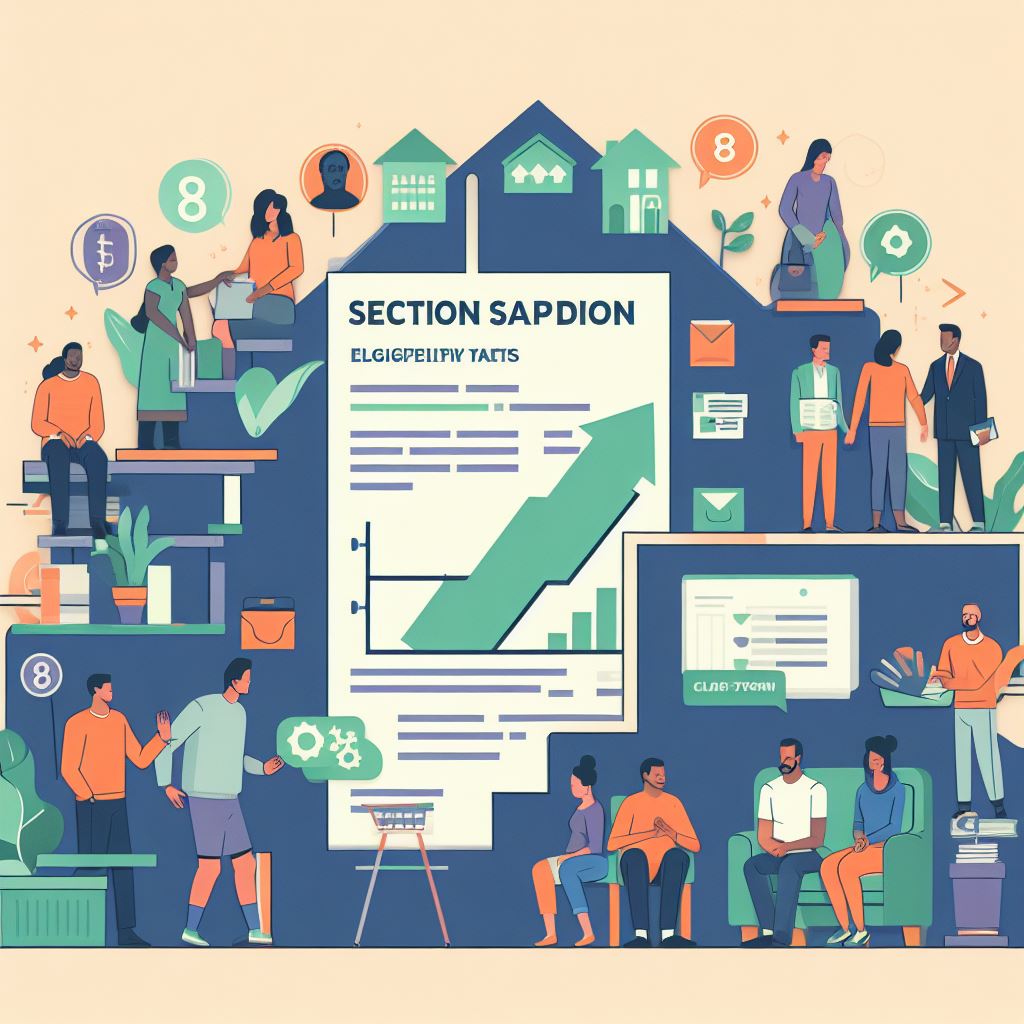Clarifying Section 8 Housing: Eligibility and Application

Are you confused about Section 8 housing? Don’t worry, we’ve got you covered. In this concise guide, we’ll break down the eligibility requirements and walk you through the application process step by step.
Contrary to popular belief, Section 8 is not as complicated as it may seem. So, let’s bust those misconceptions and provide you with the resources and support you need to navigate the world of Section 8 housing.
Let’s get started!
Key Takeaways
- Section 8 Housing is a federal program administered by the U.S. Department of Housing and Urban Development (HUD) to assist low-income individuals and families.
- Eligibility for Section 8 is based on income and requires citizenship or qualified non-citizen status. A criminal background check is conducted for adult household members.
- The application process for Section 8 involves determining eligibility, finding the local Public Housing Agency (PHA), completing the application form, and submitting it according to the PHA’s instructions.
- There are common misconceptions about Section 8, including that it assists working individuals, undergoes rigorous screening, and the majority of housing is well-maintained. Challenging these misconceptions can foster understanding and support.
Section 8 Housing: An Overview
First, let’s give you an overview of Section 8 Housing. Section 8 Housing is a federal program designed to assist low-income individuals and families in finding safe and affordable housing. It’s administered by the U.S. Department of Housing and Urban Development (HUD) and provides rental assistance to eligible participants.
The program works by allowing qualified individuals to receive a housing voucher, which they can use to help pay for a portion of their rent. This voucher can be used to rent a unit in the private market, as long as it meets certain requirements set by HUD. The amount of assistance received is based on the individual’s income and the local rental market.
Section 8 Housing offers different types of programs, including the Housing Choice Voucher Program and Project-Based Rental Assistance. These programs aim to provide flexibility and options for participants to choose the housing that best suits their needs.
Understanding Section 8 Eligibility
To determine if you’re eligible for Section 8 Housing, you must meet certain requirements set by the U.S. Department of Housing and Urban Development (HUD). Here are the key factors you need to consider:
- Income eligibility: Your total household income must be below a certain level, which is typically set at 50% of the median income for your area. This ensures that Section 8 benefits are provided to those who truly need assistance.
- Citizenship or immigration status: You must be either a U.S. citizen or a qualified non-citizen to be eligible for Section 8 Housing. This requirement ensures that the program benefits those who’ve a legal right to reside in the country.
- Criminal background check: A criminal background check will be conducted for all adult household members. Certain criminal offenses, such as drug-related convictions, may make you ineligible for Section 8 assistance.
Understanding these eligibility requirements is crucial when considering Section 8 Housing. Meeting these criteria ensures that the limited resources available under the program are allocated to those who are genuinely in need of affordable housing.
Step-by-Step Guide to Applying for Section 8
Are you ready to learn how to apply for Section 8 Housing? Follow this step-by-step guide to navigate the application process smoothly.
- Determine eligibility: Before applying, make sure you meet the income requirements set by the Department of Housing and Urban Development (HUD). Gather necessary documents such as proof of income, identification, and social security numbers for all household members.
- Find your local Public Housing Agency (PHA): Use the PHA locator tool on the HUD website to identify the agency serving your area. Contact them to inquire about Section 8 availability and application procedures.
- Complete the application: Obtain the Section 8 application form from your PHA. Fill it out accurately, providing all required information. Remember to sign and date the form before submitting.
- Submit the application: Return the completed application to your PHA either in-person, by mail, or online, following their specific instructions. Keep copies of all submitted documents for your records.
- Wait for notification: Once your application is received, the PHA will review it to determine your eligibility. You’ll be notified of the decision by mail or email.
- Attend an interview: If your application is approved, you’ll be scheduled for an interview with the PHA. Be prepared to provide additional documentation and answer questions about your housing needs.
Common Misconceptions About Section 8
Don’t fall for the misconceptions surrounding Section 8 housing. There are several common misconceptions about this program that often lead to misunderstandings and stigma. Let’s clarify them:
- Section 8 is only for people who are unemployed or lazy: This is far from the truth. Section 8 is designed to assist low-income individuals and families, including those who are working but still struggle to afford safe and decent housing.
- Section 8 recipients are all criminals or troublemakers: This stereotype is unfair and unfounded. Section 8 participants undergo a rigorous screening process, which includes criminal background checks, to ensure the safety and well-being of their communities.
- Section 8 housing is run-down and poorly maintained: While it’s true that some landlords may not properly maintain their properties, the vast majority of Section 8 housing is well-maintained and subject to regular inspections to meet quality standards.
By debunking these misconceptions, we can help foster a more understanding and supportive community for Section 8 applicants and recipients.
Now, let’s dive into the next section to explore the resources and support available for Section 8 applicants.
Resources and Support for Section 8 Applicants
If you’re applying for Section 8 housing, it’s important to be aware of the various resources and support available to assist you throughout the application process.
The first resource you should utilize is the local Public Housing Agency (PHA) office. They can provide you with information on eligibility requirements, the application process, and any specific documentation you may need to submit. The PHA office can also answer any questions you have and guide you through the entire process.
Another valuable resource is the Section 8 Housing Choice Voucher Program website. It provides detailed information about the program, including eligibility criteria, application procedures, and a list of participating PHAs. The website also offers resources such as FAQs, forms, and contact information for further assistance.
In addition to these resources, you may find it helpful to reach out to local community organizations that specialize in housing assistance. They can provide guidance, support, and even workshops to help you navigate the Section 8 application process successfully.
Frequently Asked Questions
Are There Any Income Limits or Requirements for Section 8 Housing?
Yes, there are income limits and requirements for Section 8 housing. These help determine if you are eligible for the program. It is important to meet these criteria to qualify for assistance.
How Long Does the Section 8 Application Process Typically Take?
The Section 8 application process can feel like an eternity. It involves paperwork, waiting, and lots of anticipation. However, on average, it typically takes around 2-4 months from submission to approval.
Can Section 8 Assistance Be Used to Cover the Cost of a Mortgage?
Yes, section 8 assistance can be used to cover the cost of a mortgage. This program, also known as the Housing Choice Voucher Program, provides rental assistance to eligible low-income individuals and families.
Can I Apply for Section 8 Housing if I Have a Criminal Record?
Yes, you can apply for Section 8 housing even if you have a criminal record. The eligibility criteria take into account various factors, including the nature of the offense and how long ago it occurred.
Can Section 8 Assistance Be Used to Rent a Room in Someone Else’s Home?
Yes, you can use Section 8 assistance to rent a room in someone else’s home. This program provides financial support for eligible individuals to access safe and affordable housing options.



